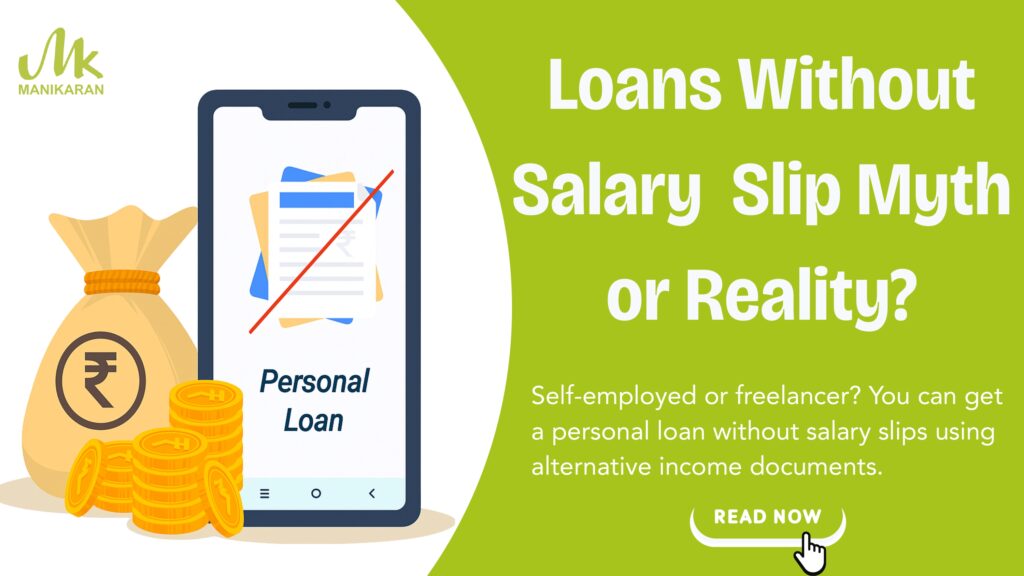Introduction
Personal loans have become the most sought-after method of dealing with sudden financial requirements. Whether it is for medical expenses, education, weddings, home makeover, or settling debts, personal loans are opted for in large numbers due to their ease, flexibility, and speedy disbursal. However, most are hesitant to go for it because they think one thing — that one needs a salary slip. This is a general misunderstanding.
Though salary slips are the common income proof provided by salaried workers, they are not the only means of assessing your ability to repay. It is actually because of the growth in NBFCs and online lenders that lending institutions now offer you a personal loan even if you don’t possess salary slips. What is crucial for the lender is whether you have a regular source of income and can repay the loan amount.
This post uncovers the secret of availing a personal loan without a salary slip, detailing the alternatives, the procedure, and the aspects that you must take into consideration to enhance your chances of getting approved.
Why Lenders Require Salary Slips
Salary slips are conventionally among the simplest methods for lenders to confirm a borrower’s income. They present evidence of regular employment, monthly income, and stability of cash flow. For salaried borrowers, this enables lenders to determine repayment capability and choose loan eligibility.
But not everyone possesses a salary slip. Self-employed people, freelancers, entrepreneurs, and even newly hired personnel may not always have this document at their disposal. In these circumstances, to refuse a loan application categorically would deny a vast majority of prospective borrowers. It is to open up loans to a broader populace that lenders now accept other income proofs.
Obtaining a Personal Loan Without Salary Slip
The fact is, you can even obtain a personal loan without a salary slip by offering alternative proofs that indicate your income and repayment capacity. Most NBFCs and online lenders are considerate and provide loans to applicants with financial stability by other documents.
Bank statements are among the strongest alternatives. If you can furnish six months’ statements with frequent credits — be it from freelancing work, business income, rent, or commissions — it is proof that you have a steady income stream. ITRs are also much appreciated by lenders, particularly for self-employed individuals. By furnishing your ITR of the past two to three years, you establish not only your income but also your financial discipline.
A few lenders also consider taking appointment letters or employment certificates in case you have recently been employed but do not yet have salary slips. Such documents assure lenders that your income will be regular in the next couple of months.
Other Alternatives Lenders Accept
Besides bank statements and ITRs, the lender will also look into several other documents based on your profile. Businessmen can produce GST returns, audited accounts, or proof of business turnover, for instance. Pensioners can provide pension slips as proof of regular income post-retirement. Rental income agreements, fixed deposit receipts, and even investment income are used to ascertain repayment capacity from time to time.
If direct evidence of income cannot be produced, the applicant can still be considered by applying with a co-applicant who enjoys a steady income. This minimizes the risk of the lender and makes the chances of approval higher for you. In certain situations, providing collateral like a fixed deposit or insurance policy can also ensure the loan without salary slips.
The Role of Credit Score in Approval
When salary slips are not available, lenders place greater emphasis on other measures, more specifically your credit score. A good CIBIL (usually 700 and more) shows that you have managed previous credit well. It comforts lenders that you will also pay the new loan at the right time. Even if you don’t have a salary slip, a solid credit score increases your approval chances much more.
Conversely, a bad score will make life challenging for you, as lenders can consider you a risky borrower. Hence, prior to taking a personal loan without a salary slip, one should check the credit score and, if necessary, work towards enhancing it. Timely payment of bills, lowering the credit card balance, and settling old dues can improve your credit profile.
Advantages of Loans Without Salary Slips
The provision to obtain a loan without salary slips has increased personal financing accessibility. Freelancers, small business operators, gig workers, and those not in conventional employment systems now get access to funds when they need it. It breaks reliance on family and friends for sudden funds and also offers a formalized, transparent method of taking loans.
Additionally, because these loans come from reputable financial institutions, they are covered under definite terms and prescribed repayment timetables. Not only does this ease monetary pressure, but it also makes it possible for borrowers to establish a credit history, something that cannot be done by borrowing cash from family members informally.
Challenges and Things to Keep in Mind
While it is possible to get a personal loan without salary slips, it is not always as easy as having them. Lenders may impose stricter checks, such as higher interest rates, shorter tenures, or lower loan amounts. Some may even require additional documents or a guarantor to balance the risk.
Applicants must also be mindful of over-borrowing. Because the lender is offering you a loan without the need for salary slips, it does not mean you should borrow more than you can repay comfortably. Over-borrowing may result in defaults, which not only hurt your credit score but also leave you unable to borrow money in the future.
Tips to Improve Your Chances
If you are going to make an application for a personal loan without salary slips, there are some steps you can take to improve your chances of being approved. First, have healthy and clean bank statements. Lenders examine them carefully, so it is best to avoid cheque bounces or anomalies. Second, keep your ITR filings recent since this shows that you are financially responsible. Third, keep your debt-to-income ratio in check. If you already have pending multiple loans or credit card payments, attempt to lower them prior to approaching. Lastly, select the appropriate lender. Traditional banks might be exigent, but NBFCs and online lenders are generally lenient in sanctioning such loans.
Conclusion
The myth that personal loans won’t be available without salary slips is a thing of the past. Though salary slips are still one of the popular income proofs for salaried customers, it’s not the sole one. With options such as bank statements, ITRs, employer certificates, rental agreements, and even co-applicants, you can avail a personal loan without any hassle.
The most important thing is to demonstrate that you have a stable source of income and a sound history of credit management. A good credit score, clear documentation, and financial responsibility will do much to ensure that your request is approved.
So, if you’ve been holding back from applying for a personal loan because you don’t have salary slips to show, relax — the reality is that personal loans without salary slips are quite feasible. Proper preparation and a suitable lender are all it takes to get access to money in a smooth and responsible manner, without relying on family or friends.



